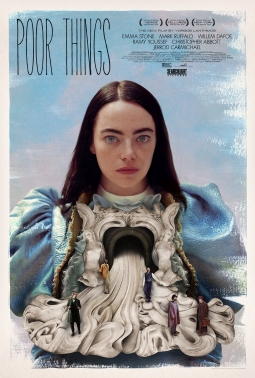Poor Things

Poor Things is an adult satire-fantasy, a grown-up fairy tale which evokes steampunk, the surreal and the absurd in delivering the tale of a woman’s sexual awakening and exploration of world and self. It pulls off a flamboyant production design (led by Shona Heath and James Price) which reminds me of Henry Selick, Tim Burton, Wes Anderson, and George Miller’s films – distinct from all, but perhaps existing on a continuum among them. Emma Stone stars as Bella, an adult woman who begins with the mind of a child, learning at first slowly and then rapidly to be a person through the pursuit of pleasure and then of self-improvement.
Stone is firstly supported by Willem Dafoe, who plays her father figure Godwin Baxter, a nearly-mad scientist that speaks very clinically while operating in a world where organic chemistry, if not basic physics, works quite a bit differently than in our own. It’s a way that feels inherited from fables, mysticism, and the speculative fiction of the 19th century. In fact, early on I find myself thinking of Frankenstein, Edward Scissorhands, and A Nightmare Before Christmas, where a mad scientist brings life to the inanimate and, specifically in the last case, to a woman that he cloisters. This is compounded by Godwin’s tattered visage (his face and body are covered in a latticework of surgical scars) and at one point early on, in one of the film’s first transitions from grayscale to color, feels to invoke the pulp horror of the 60s and 70s in its color composition and use of light as much if not more than horror stories and films before the Hays Code.
Dafoe’s Godwin is obsessed with his work as a man of science, is disfigured by his father’s experiments on him, and is only begrudgingly affectionate. Ramy Youssef is his student in medical school (Max McCandles, a last name if not first name drawn from the novel by Alasdair Gray from which this film is adapted), who Godwin contracts to observe Bella, with whom he grows intrigued and of whom protective. Mark Ruffalo plays Duncan Wedderburn, a scheming lawyer and worldly cad who tries and fails stupendously to control Bella. Much of the film’s comedy comes from their conflicts as they travel.
Poor Things is a very sexual movie, more than I expected from the trailers. The film’s use of nudity evolves from feeling mildly intentionally discomforting based on the mental aptitude of the protagonist to appropriately provocative without ever feeling cheap.
Emma Stone’s performance really is remarkable. Early on, she is so effective portraying the mind of a child that I am uncertain whether it came off – such full commitment to performing incompetency that it borders concern she might perpetuate caricature and bring us an unwatchable picture. However, the nuance reveals itself soon enough, and then the character’s development through personhood and psychological adulthood provides the audience reflections of how weird our world is, boiled down to the observations of someone thrust into understanding it very rapidly by a man who offers her adventure and freedom in an effort to control her, taken her out of a castle-laboratory, with empiricism as her guiding principle.
In less able hands, Poor Things could very easily be incredibly tedious. It is instead some of Lanthimos’s most visually daring and generally aesthetically experimental work. It does retrospectively have the feeling of a novel adaptation, but I didn’t know it was one until the credits. The film’s greatest sin may be that it falls short of garnering the high-minded but bloviating and flaccid praise of alleged social importance. Its critiques are accurate but not mind-blowing. Still, the recurrence of Bella repeating people’s ideas to them reworded as observations or curious queries is a joyous experience.
The place this most daringly demonstrates itself is when sex work enters the world of the film. Poor Things does not depict Bella here as a victim but as an agent in her life, perhaps even an innovator, and certainly someone wise and fortunate enough to make the most out of any situation. It is even, in fact, due in part to her own desire and empirical curiosity which brings her to this occupation.
Poor Things is one of the better films released in 2023, among my personal favorites. It intends to make its audience think about the absurdity of our world. It succeeds in this, observing and commenting on misogyny, violence, and contortion in capitalism, patriarchy, and even colonialism. It’s bright and witty and safely away from being dry and redundant. It probably isn’t going to win Best Picture at the Oscars, but it feels like real art without being dour, and everything I thought wouldn’t work does. It’s clever and enjoyable, superior in my estimation to The Lobster, if not The Favourite.
Pingback: On Review Scores, and objective scales of subjective experience | pcvulpes